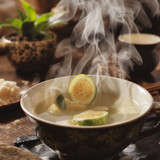

Starwest Botanicals
Organic White Tea Bags
White Tea Bags vs. Green Tea: Why They’re Different White tea and green tea come from the same plant—Camellia sinensis—but they’re made differently. That difference in processing is why white tea...
Yan Hu Suo, also known as Corydalis Rhizome, is a revered herb in Traditional Chinese Medicine (TCM) celebrated for its natural pain-relieving and circulation-enhancing properties. Derived from the tuber of the Corydalis yanhusuo plant, it is often used to address discomfort caused by stagnation of Qi and blood. Known for its ability to promote balance and ease, Yan Hu Suo is a versatile remedy for managing headaches, menstrual pain, and muscle tension, making it a staple in TCM for supporting overall wellness.
Common Name: Corydalis Root
Botanical Name: Corydalis yanhusuo rhizoma
Chinese / Pin Yin Name: Yan Hu Suo
Yan Hu Suo Dosage: Follow doctor's instructions for use.
Yan Hu Suo Precautions: Do not use if pregnant or nursing. Do not use long term.
Yan Hu Suo is a traditional Chinese medicinal herb that is harvested in the summer time after the stems of the plant have withered. It is known for providing botanical support for a healthy cardiovascular system and joint flexibility.
Yan Hu Suo Properties: Warm, Bitter, Acrid
Yan Hu Suo Channels: Heart, Lung, Stomach, Liver

Yan Hu Suo, also known as Corydalis Yanhusuo or Yanhusuo, is an herb used in traditional Chinese medicine (TCM) with potential health benefits. Here are five benefits associated with Yan Hu Suo:
| Pain Relief: | Yan Hu Suo is often used in traditional medicine for its analgesic (pain-relieving) properties. It is believed to help alleviate various types of pain, including menstrual pain, abdominal pain, and pain associated with injuries or inflammation. Some of its compounds may act on pain receptors and pathways in the body. |
| Cardiovascular Health: | Some studies suggest that Yan Hu Suo may have cardiovascular benefits. It may help regulate blood flow and reduce blood pressure. Additionally, it might have mild antiplatelet and anticoagulant effects, potentially contributing to heart health. |
| Anti-Inflammatory Effects: | Yan Hu Suo has been traditionally used for its anti-inflammatory properties. It may help reduce inflammation in the body, making it potentially beneficial for conditions associated with inflammatory processes, such as arthritis. |
| Relaxation and Sedation: | Yan Hu Suo is believed to have mild sedative and relaxing effects on the nervous system. This property may help reduce stress and anxiety, promoting a sense of calm. It is sometimes included in herbal formulations aimed at addressing emotional well-being. |
| Gastrointestinal Support: | In traditional medicine, Yan Hu Suo is used to support digestive health. It may have mild gastroprotective effects and could be helpful in addressing issues such as indigestion or abdominal discomfort. |
Yan Hu Suo (Corydalis Yanhusuo) may be combined with other herbs based on the specific health condition being addressed. Here are some examples of herbs that are commonly combined with Yan Hu Suo:
Wu Yao (Lindera Root): Often used together with Yan Hu Suo to enhance the analgesic effects and relieve pain, especially in conditions such as abdominal pain and menstrual discomfort.
Xiang Fu (Cyperus Rotundus): This herb is known for promoting Qi circulation and soothing the liver. When combined with Yan Hu Suo, it may help alleviate pain and discomfort associated with liver Qi stagnation.
Chuan Xiong (Ligusticum wallichii): Used to invigorate blood circulation, Chuan Xiong is sometimes combined with Yan Hu Suo to enhance the overall effectiveness in addressing conditions involving blood stasis and pain, such as headaches.
Gan Cao (Licorice Root): Known for its harmonizing properties, Gan Cao is often added to herbal formulations to balance the actions of other herbs and reduce potential side effects. It may also help enhance the pain-relieving effects of Yan Hu Suo.
Bai Shao (White Peony Root): Bai Shao is commonly used to nourish blood and regulate the liver. When combined with Yan Hu Suo, it may help address pain associated with liver imbalances and menstrual issues.
Huang Qin (Scutellaria Baicalensis): This herb has anti-inflammatory properties and is sometimes added to formulations with Yan Hu Suo to enhance the overall anti-inflammatory effects.
Yi Mu Cao (Leonurus japonicus): When addressing gynecological issues, such as menstrual pain, Yi Mu Cao may be combined with Yan Hu Suo to enhance the formula's effectiveness.
It's crucial to note that the specific combination of herbs depends on the individual's unique constitution and the targeted health condition. Herbal formulations in TCM are highly personalized, and it is advisable to consult with a qualified TCM practitioner or herbalist for a tailored approach to your health concerns. Additionally, always consult with a healthcare professional before starting any herbal regimen, especially if you are pregnant, nursing, or taking medications.
Resources
https://herbpathy.com/Uses-and-Benefits-of-Yan-Hu-Suo-Cid2657, https://www.webmd.com/vitamins/ai/ingredientmono-415/corydalis
https://www.ncbi.nlm.nih.gov/pmc/articles/PMC8704877/
https://www.americandragon.com/Individualherbsupdate/YanHuSuo.html
https://en.wikipedia.org/wiki/Corydalis_yanhusuo
https://www.sciencedirect.com/topics/biochemistry-genetics-and-molecular-biology/corydalis